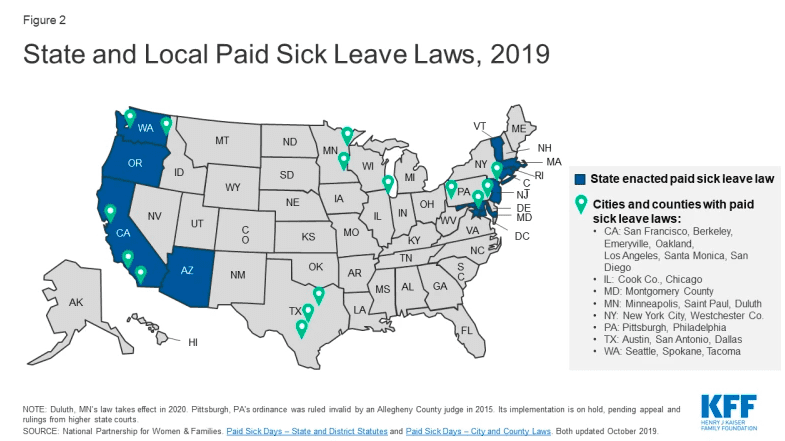From coronavirus to the flu, public health issues impact our workplaces
Workers are speaking out to protect their health
FEBRUARY 12, 2020 | COWORKER.ORG

The spread of coronavirus has impacted numerous workplaces — and workers are speaking out, too.
The virus has disrupted many workplaces around the world. Factories have been shut down impacting everything from the auto industry to fast food. Cathay Pacific Airways has asked employees to take unpaid leave due to lower demand. Other multinational companies have paused employees’ business trips to China. Uber suspended the accounts of two drivers and 240 customers in Mexico who reportedly may have come into contact with someone who might have been exposed to coronavirus. Hospital workers in Hong Kong have even gone on strike due to issues related to coronavirus.
In the U.S., some union leaders have spoken out about the spread of coronavirus. As Sara Nelson, president of the Association of Flight Attendants-CWA, said: “For flight attendants, this isn’t theoretical. Aviation workers are always on the front line of any communicable disease.” In North Carolina, “Charlotte Area Transit System workers are pushing for more protection from the deadly virus, such as supplies of hand gel and masks.”
The spread of the virus has been accompanied by misinformation as well as xenophobic and racist responses that build on a long history of racialization of illness. In this case, workers of Asian descent have reported experiencing economic hardships. Rideshare drivers have said that they’ve dealt with “inappropriate comments or cancellations due to their appearance or name.” Bloomberg interviewed “an Uber driver of Asian American descent in the Los Angeles area [who] said that since the outbreak, she’s getting frequent cancellations, lower ratings and fewer tips from customers.”
The CDC even issued instructions stating: “Do not show prejudice to people of Asian descent, because of fear of this new virus. Do not assume that someone of Asian descent is more likely to have 2019-nCoV.” As some have cautioned: “employers [and employees] may want to pay attention to any concerns that Chinese employees are being subjected to disparate treatment or harassed in the workplace on the basis of national origin.”
While the spread of coronavirus has posed specific challenges to workers globally, it is also a reminder of the longstanding problems workers face when they’re sick.
In the U.S., there are no federal legal requirements for paid sick leave. The Guardian recently reported that workers without paid leave “suffering from life-threatening illnesses and conditions such as kidney failure and cancer [have] little option but to work when they are not medically fit to do so, and having to go to extraordinary measures to fit treatment around their jobs.” Additionally, “National studies reveal 80 percent of those without paid sick days are low-wage workers, such as servers and cooks… Restaurant, childcare and home health workers are in direct contact with the public. When they go to work sick, they spread germs to some of our most vulnerable residents.”
While coronavirus might not be the biggest health risk to U.S. workers at the moment, millions of people have been impacted by the flu. The C.D.C. reported in late January 2020 that “there have been an estimated 19 million cases of flu, 180,000 hospitalizations and 10,000 deaths in the U.S. this influenza season — including 68 children.” In some states, school systems have been closed for periods of time due to the illness.
Some U.S. cities and states have mandated paid sick leave and some employers have paid sick leave policies as well, but millions of workers are often faced with a difficult decision of whether to lose pay or go to work sick. Even some workers who do have access to paid leave report facing a variety of barriers to actually taking sick days.
One researcher wrote recently:
These conditions create a near-guarantee that workers will defy public health warnings and trudge into their workplaces, regardless of symptoms. In this way, a manageable health crisis can spiral out of control.
We saw this happen during the last outbreak of H1N1 swine flu in 2009. One estimate found that at least 3 in 10 workers in the private sector did not take time off from work when sick with the virus, which led to up to seven million additional infections and may have extended the outbreak.
But workers are taking action to expand access to paid sick leave. For example, hourly employees at AMC Theatres are joining this campaign on Coworker.org calling on the movie theater chain to provide paid sick leave (as well as holiday and overtime pay), like their managers receive.
If you want to change policies related to sick leave — or other issues — in your workplace, you can start your own campaign on Coworker.org. Looking for other tips? Check out this post for some do’s and don’ts for engaging colleagues and supporters on a workplace issue or this simple guide to talking about workplace issues with your coworkers.
Coworker.org is a global platform to advance change in the workplace. Our platform makes it easy for individuals or groups of employees to launch, join, and win campaigns to improve their jobs and workplaces. You can start your own campaign for changes you want to see in your workplace here at Coworker.org, or contact us at [email protected] if you would like to discuss a workplace issue with our team.
LABOR WORKERS RIGHTS STRIKE




